It is only mid-January, but there are already several concerning developments regarding the Russia-Ukraine war: the escalation of intensive Russian airstrikes on Ukrainian cities; the prospect of a prolonged war of attrition along the Eastern front; the recognition that the 2023 counteroffensive did not disrupt Russian supply routes in the south; the inability of EU countries to produce and deliver promised ammunition and last but not least; the blockage of aid in the United States Senate. Our site already covered stories from the perspectives of foreign soldiers. Last time, we summarised the recent developments of the war itself. Now, it’s time to hear the voices behind the front lines.
Living in War-torn Ukraine as a Minority – Anna’s Story
Anna is an ethnic Hungarian who lives in the Transcarpathian region, a small village just 25 kilometers from the Hungarian border. She has always lived there, and she never planned to move. Anna was born into a family of mixed nationalities, half Hungarian and half Ruthenian, although they communicate in Hungarian. She is currently studying to become a mental health professional. (Due to the interviewee’s safety concerns, we changed the name.)
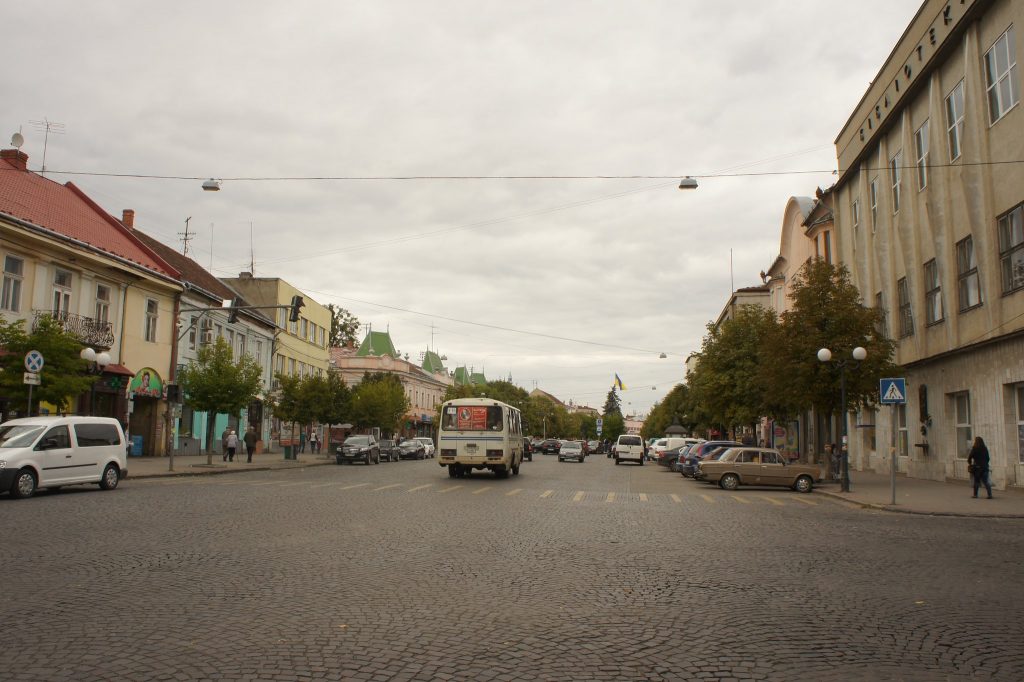
City view of Mukachevo, Transcarpathia (Photo: spoilt.exile/flickr.com)
When I ask her about the changes the war has brought to her life, she replies: “The life I lived before February 24, 2022, is like another life I didn’t live” – that’s how Anna described her life in a war-torn country. “I was 14 when the conflict broke out in eastern Ukraine ten years ago. Most of my friends had left home by then. In our class, 19 of us graduated from the local primary school, and only five of us stayed at home.”
“Yes, I feel war fatigue,” Anna responds when I ask her to describe the general feeling in her neighborhood, whether people show signs of apathy because of the war. “For example, after a few months, the wailing air raid siren was no longer unusual or frightening. The countless reports of soldiers dying can get you down after a while. The most disturbing of all is the fear that someone I know might be the next to die. One of my distant relatives is missing; he joined the Territorial Defense Forces, but we don’t know much about him. A childhood friend of mine has also disappeared in the Donetsk province since October.”
Anna also mentioned that sometimes the authorities and the nationalists make living conditions even more difficult in Transcarpathia.
“Just a few days ago, the authorities conducted a census in the nearest village to see how many people live in each house. The public mood is more tired than patriotic. Except for a few blatant cases, community life is functioning. As the governor of Transcarpathia, Viktor Mikita, rightly said: Those who feel so brave and patriotic should put their zeal to good use on the front, as it will be of greater service to the country. For as long as I have been alive, I have heard that the Hungarians will disappear from Transcarpathia, and then we are still here.”
Anna told me that her grandparents from one side were Orthodox, and the others were the Reformed Church, so they had two Christmases and two Easter holidays for a long time.
She confirms that the ethnic nationals living side by side are much more tolerant than others might think.
“We know and respect each other’s traditions. Then, the politicians think they can change these centuries-old traditions with a single act. Good luck with that! The Orthodox people around me celebrated Christmas on January 7, as always.
When I ask her about fleeing the country, Anna is very determined:
“When the war broke out, my parents begged me to leave, but I decided to stay. Even today, I can move to Hungary, but I think of my Ruthenian maternal great-grandfather, who spent two years at the front in World War II, then was looted by the Soviet regime. He had to start his life over more than once, and yet he stayed. There are times when you can’t leave. But I don’t want to be a martyr, don’t get me wrong. I trust in God to have mercy on this country. Honestly, what else can you hope for?”
Khrystyna, from Kyiv: “We Expect More Decisiveness from the West”
Khrystyna Rybachok is a resident of Kyiv. Before the war, she worked in a civil association to support human rights, reforms, and Ukraine’s EU integration process, both in Ukraine and in the Western Balkans and Central Asia. Khrystyna also spent two years working on the decentralization and public administration reform in the Ukrainian government.
“As the war started, I moved to the Czech Republic and soon joined the European Values Center Information Defense Hub, which aimed to counter Russian propaganda in the EU by providing objective information and analysis of developments in Ukraine”.
Eventually, Khrystyna returned to Kyiv and continued her sacrificial work as a member of a professional government association. It will be two years now that Ukraine has been under constant attack, including the capital. I asked her to describe a typical day in Kyiv:
“Today, for example, the air raid started early in the morning when people usually go to work. The attacks paralyse the traffic, and commuting is difficult. As I live on the left bank of the Dnipro river and work on the right bank, the bridges are closed during air raids, the ground metro does not operate. One of the goals of Russian raids is to exhaust our economy and lead our people to despair. We also have night attacks, which lead to sleep deprivation. We live in constant fear of waking up in the middle of the night from explosions.”
In response to my suggestion that although President Zelensky’s popularity is undiminished, it is no longer the case with government members, she firmly states,
“There is a kind of consensus that this administration should stay until the war is over, whatever it would mean.”
“Election under martial law would be unconstitutional and mean automatic re-election of the current president with the most resources.”
Khrystyna is also confident in the resilience of the Ukrainian people.
Ukrainian people are still full of resolve. We do not have other options. If we stop fighting, Russia will occupy all our cities and kill and torture many more people. We would have much more Mariupols and Buchas. Everyone is aware of that.
Any peace negotiations do not look realistic and would just be used by Russia to rearm (based on what happened after the Minsk, Minsk 2 agreements). Yes, people are extremely tired, especially those at the front line. We need new conscripts and new weapons. Yes, we expect more decisiveness from the West in providing us with weapons and macro-financial support if they care about their security and the future of democracy in their countries.
Finally, she remembers her deceased friends. “Although all my relatives are alive, I have lost classmates, friends from university and childhood friends who went to fight in the war.”
Dmytro Kovalchuk, a fixer and volunteer from Kyiv
Before the war, Dmytro (Dima from now on) decided to move abroad, but the attack completely changed his life.
“I was planning to move to Montenegro for a year just before the Russian attack began two years ago. I wanted to leave in April 2022. On the 24th of February, I was at my then-girlfriend’s home, and because there were rumors that the Russians could take Kyiv in three days, we thought it was very dangerous to be there; the missiles were already flying around. So, we decided to move away from Kyiv. Our friends, who lived 40 kilometers from Kyiv, they invited us to their home.”
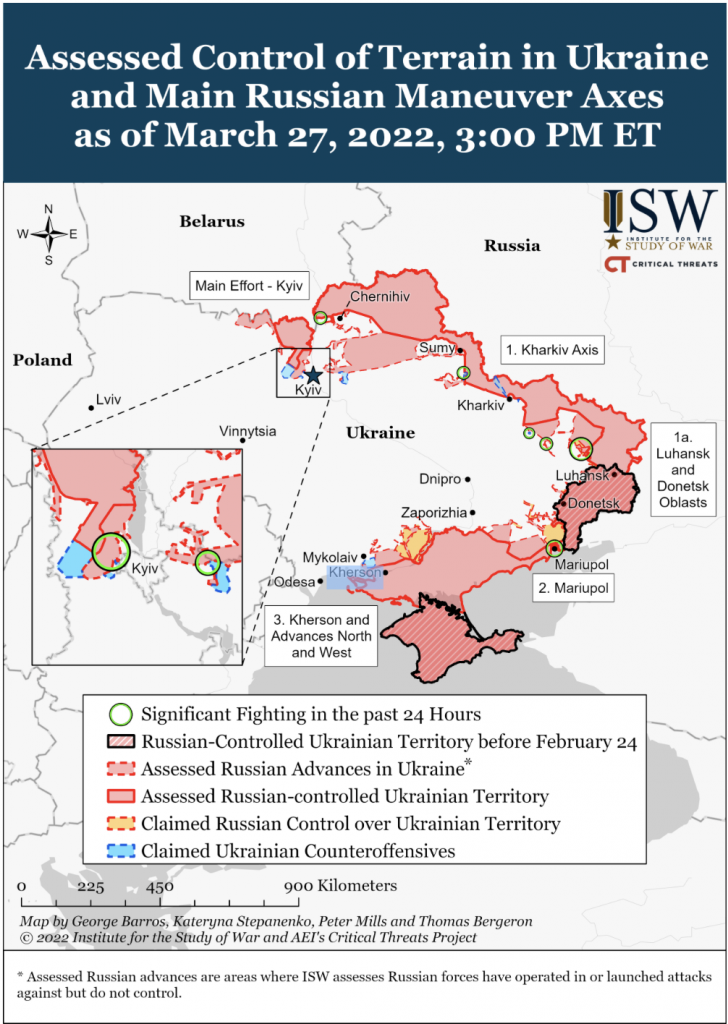
Assessed Control of Terrain in Ukraine and Main Russian Maneuver Axes
as of March 27, 2022 (Source: Institute for the Study of War)
Before long, they arrived in a village called Yasnohorodka. Their friends’ house was on the outskirts of the village. It turned out they were on the frontline; the Russian army was attacking from the direction where we were staying.
“I remember, on the first of March, a big convoy of Russian armoured vehicles arrived; they had already occupied the closest village and were trying to enter Yashnohordka.”
“In the village, there was no Ukrainian military presence, only the territorial defense unit, but it consisted of some locals with their hunting rifles and nothing else. I joined this unit, and we only did observations about the enemy. There was heavy military build-up from the Russian side, a big column of 80 vehicles.”
Around early March, peace talks were held in Belarus, so there was no movement on the front. Dima and his friends felt relatively safe. After the negotiations between the two sides failed, the Russians started to fire at the village. They fired multiple rockets, and they bombed the checkpoint and a church next to it. Unfortunately, the priest was killed in the explosion.
“It became more and more tense; we felt the rocket shelling. Thus, we decided to leave. We had two cars and petrol for 200 kms. It was enough to get out from the region, but was not enough to reach the border.”
Eventually, Dima drove his girlfriend and her children to the Hungarian border. It took three full days to reach the border because of all the checkpoints and the traffic conditions. On the second day, when they left Yashnohordka with their friends, the neighbours told them that the house had been hit by a missile, and it literally burned down. Fortunately, no one stayed there. At the border, Dima had to say goodbye to his girlfriend. He had to turn back from the border because men were no longer allowed to exit the country at that time.
“I went back to my family’s dacha (vacation property) to reunite with my family. The dacha was also in a safe area. So, I slept there for two weeks because I needed to recover from the anxiety which I went through. Then I went back to Kyiv.”
Dima worked as a marketing researcher before the war. He could continue working until the end of June 2022, but the firm closed its Ukrainian operations, so he became unemployed. Although he applied to the army and took the medical examinations, he found the process too slow and bureaucratic and looked for other options to help his people.
“Before the war, I did a lot of volunteer work, so I decided that I could help as a volunteer. In the north of Kyiv, there was a crisps factory, which was shut down, and they had a lot of potatoes to spare, so they gave them to everyone for free. Some of us organized a team; we collected the potatoes and delivered them to cities like Chernihiv, Khakriv.”
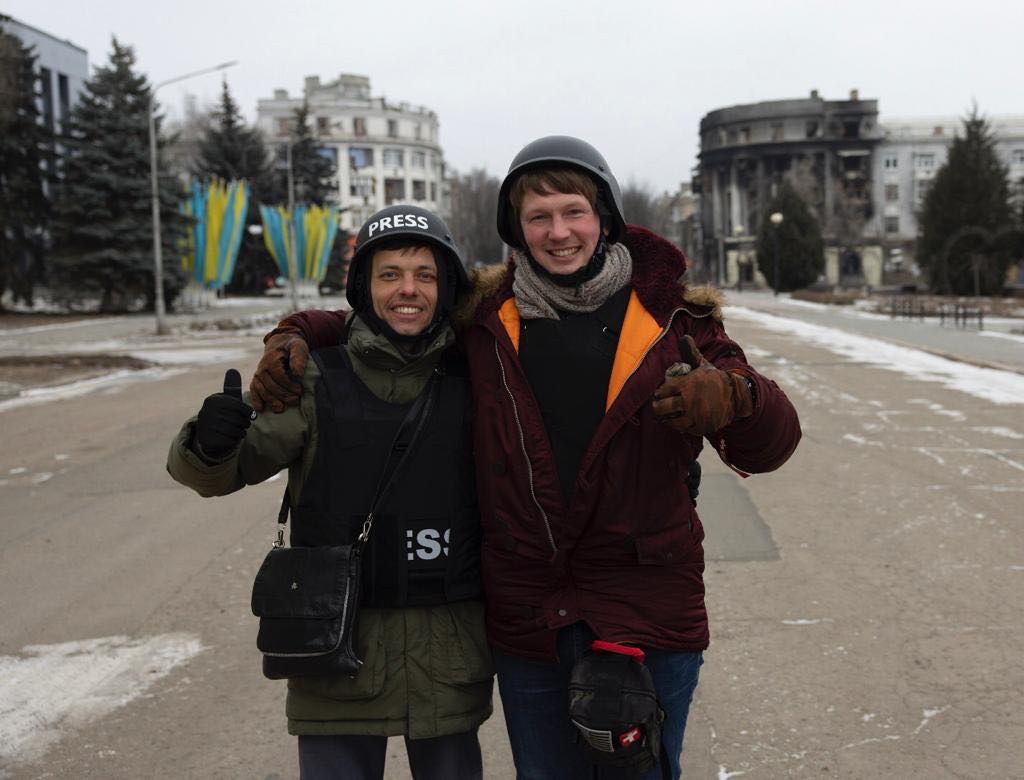
Dmytro Kovalchuk (on the right) in Bakhmut (Source: Dmytro Kovalchuk)
After his company closed, he had to look for something to earn some money. Around July, a friend of Dima’s who works as a translator for national public radio told him that an Italian media crew was looking for a fixer.
“He told me you could do it because you speak English, have a car, know the area, and you don’t need anything else. I said OKAY, let’s do it.”
That’s how he started working, first with the Italian RaiNews24, then with several other media outlets, including ones from Australia and Canada.
He also volunteered for a global empowerment mission. This charity fund provides family boxes with food, rice, tinned meat, and shampoo for frontline villages. He helped to pack and fill the boxes.
“In September 2022, I went to the Kharkiv region, the eastern front line, for the first time when our army started the counteroffensive there.”
He visited the sites of the Bucha killings, and although he didn’t see the dead bodies, it was a stressful experience for him. He also visited Bakhmut ten times. He has been to several places on the front line, like Toretsk, Niu York, Avdiivka, Kupiyansk, Dvorichna and Kherson. His life was never in danger, except on the 27th of June, 2023. That day, he went on a short trip with a Columbian politician and a famous Ukrainian writer, Viktoriya Amelina.
“We were sitting on a restaurant terrace in Kramatorsk when a Russian Iskander missile hit the building. We were lucky, but Viktoriya wasn’t, as she was hit in the head by a beam. Soon, the ambulance took her to Kramatorsk hospital, then to Dnipro, but it was not possible to save her.”
Dima also had a concussion, and it took some time to recover from that terrible day after he spent four months in rehabilitation. He spent some time in the Carpathian region and travelled to Portugal. He never thought about giving up his new profession. He believes that his work helps his country draw attention to all the pains and sorrows as well as the glory.
“We don’t talk about the war on a daily basis. We see the stories about the fighting from Instagram or Telegram, but we try not to talk about it” – said Dima, explaining how they manage to avoid the madness.
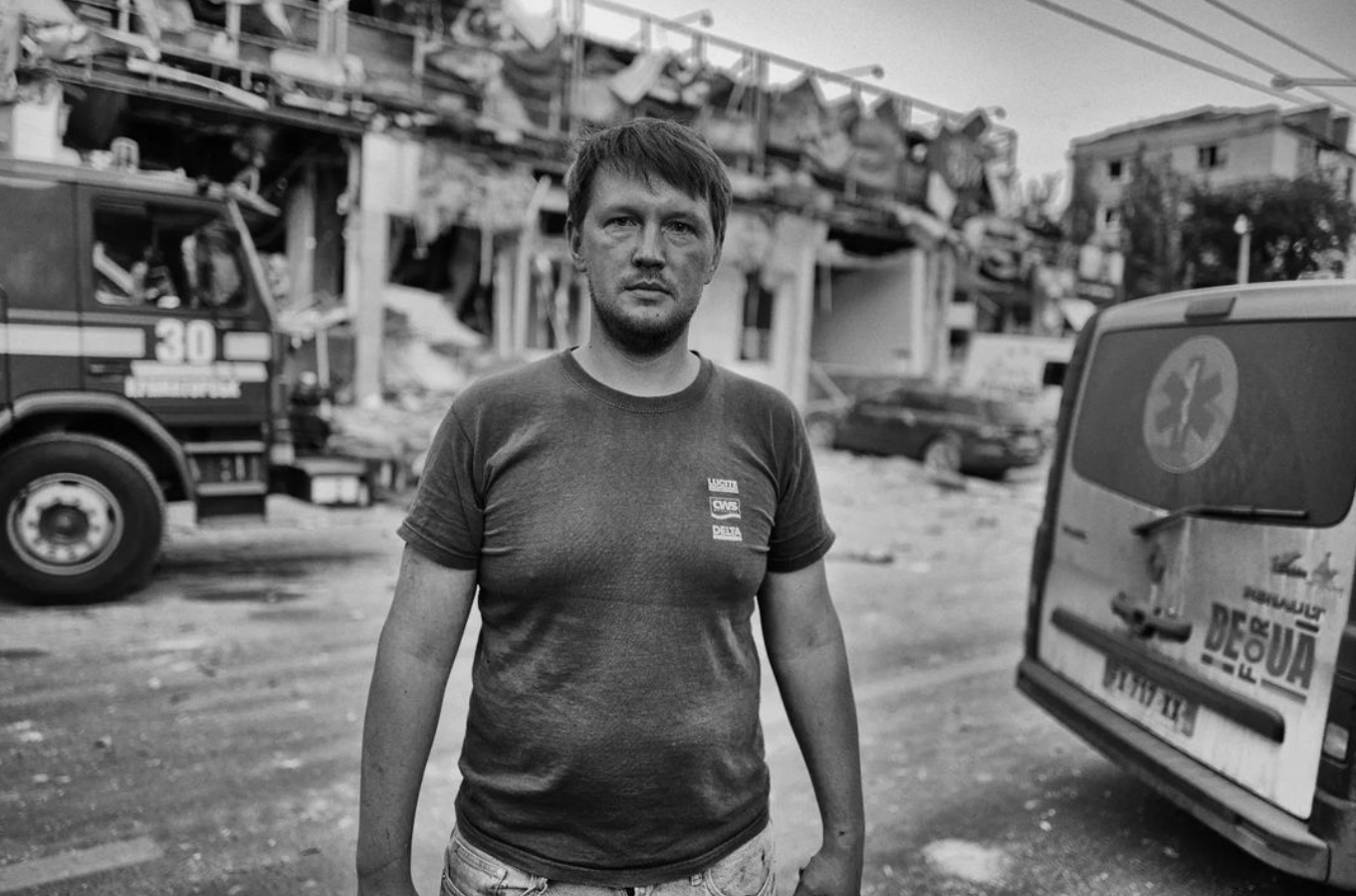
Dmytro Kovalchuk after the explosion of a Russian missile in Kramatorsk 27th June 2023 Source: Dmytro Kovalchuk’s Instagram profile
Despite the constant Russian missile attacks, Dima stressed:
“We are not thinking about ‘giving land for peace’ kind of deals with the Russians. Why? Because we know them. The Russians don’t just want our territories, they want to destroy our identity as an independent nation.”
To the question of when this madness will end, Dima answer is menacing: “I think never. Because, as I said, we have already adapted to the situation. It’s part of our life. We have this inner resistance. We’ve seen the tortures, what the invaders did to the civilians, to our soldiers. I have seen these atrocities with my own eyes when I visited Avdiivka, Izium and Bakhmut, and I assure you that the occupiers didn’t give a damn about conquering the land. Our souls they want to subjugate.
According to Dima, the war will never really be over.
“Of course, there will be peace talks, but first, we must push them out of our territory by force. After that, we can sit down for any negotiations. Until this happens, we depend on Western support, both military and financial. We also need more sanctions against Russia because all their missiles are made of a lot of cheap electronics from the West. We must prevent Moscow from getting these products.”
Dima appreciates the Hungarian people and loves their national cuisine very much, he is also grateful to the local Hungarians who have helped his fellow Ukrainians who fled to the country. Although he still doesn’t understand Viktor Orban’s policy, i.e., why he is against the financial support of Ukraine. “We are not the ones who chose to be attacked and want to emigrate from our homeland.”

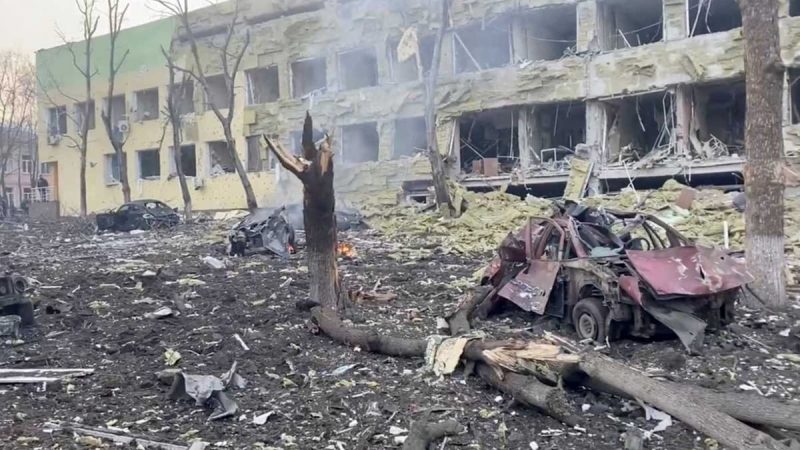
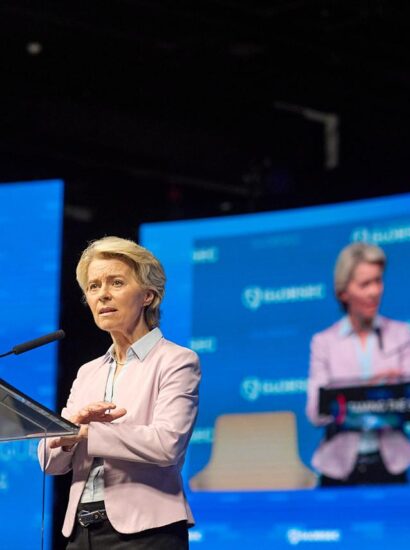
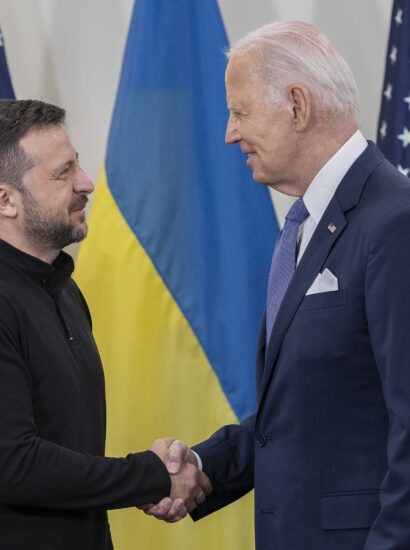
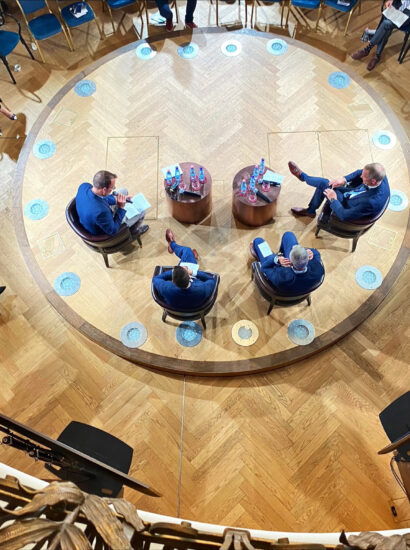
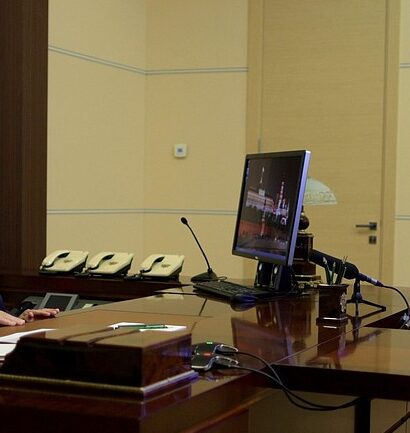


[…] geopolitical importance and poverty (we are speaking about a destroyed country because of the war) its accession would have disruptive effects in the EU. Not to mention that opening the doors to […]
[…] years and counting. This assault on the sovereignty of Ukraine and its people continues to disrupt every aspect of civilian life. Much of the war’s damage is plain to see: lives that have been lost, wounds (physical and […]